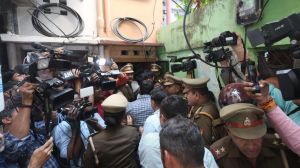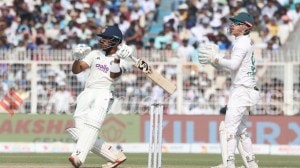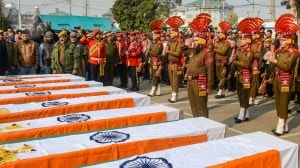Who are the 20 ‘unknowns’ taking on Arvind Kejriwal in New Delhi: AAP vs BJP, also AAP (Peoples) vs BLP
The Assembly constituency has the most candidates of any of Delhi’s 70 seats. But that has almost always been the case in this high-profile seat
 The Aam Aadmi Party (AAP) issued a “middle-class manifesto” this week, with a series of demands from the Centre. (Express Photo by Tashi Tobgyal)
The Aam Aadmi Party (AAP) issued a “middle-class manifesto” this week, with a series of demands from the Centre. (Express Photo by Tashi Tobgyal)AAPKI Apni Party (Peoples) and Bharatiya Liberal Party. While all eyes have been trained on the three high-profile candidates in the coveted New Delhi Assembly seat in the coming Assembly polls, these are just two of the many small parties and seven Independents who are behind the constituency’s tally of the highest number of contestants in the fray, at 23.
New Delhi, the country’s seat of power literally, has always drawn a high number of contestants as compared to other Assembly constituencies of the state. In 2020, as many as 28 were in the fray here.
This time, the 23 include sitting MLA and Aam Aadmi Party (AAP) national convener Arvind Kejriwal, the BJP’s former MP Parvesh Verma, and senior Congress leader Sandeep Dikshit. The BSP, which has put up candidates in all the 70 constituencies of Delhi, has one in the fray in New Delhi as well.
Apart from them and the Independents, there are 12 faces from smaller parties such as the Aapki Apni Party (Peoples) or AAP (Peoples) and Bharatiya Liberal Party (BLP), whose acronyms are deceptively close to their more famous counterparts.
However, the most prominent small outfit is the Right to Recall Party, founded in 2018 by Rahul Mehta, the son of former Union minister Chimanbhai Mehta. The party, whose main agenda is giving people the right to recall their elected officials (as practised in the United States, among other countries), has fielded as many as 19 candidates across Delhi.
Rahul Mehta, in fact, has doggedly carried on in successive polls, and not just in Delhi or native Gujarat, despite no electoral success. In the 2020 Delhi polls, it fielded four candidates, while in the 2024 Lok Sabha elections, it had 33 candidates across 10 states.
The Bharatiya Liberal Party or BLP was founded in 2019 by businessman Ramesh Gupta, with the stated aim of “pursuing democratic reforms”, and is contesting its first Delhi Assembly polls. Its current president, Munish Kumar Raizada, supported the India Against Corruption movement in 2011, spearheaded by Kejriwal, and was a member of the AAP until he was suspended for backing the RJD during the 2015 Bihar Assembly polls.
The Aapki Apni Party (Peoples) or AAP (Peoples) is contesting five seats, including New Delhi, Model Town, Chhattarpur, Rajouri Garden and Burari. It was registered with the Election Commission in 2018 and is a Delhi-based party.
The other smaller parties in the fray in New Delhi are Rashtriya Manav Party, which is contesting seven seats in all, and the Bhim Sena, which has put up candidates in four. The Rashtriya Manav Party in its aims invites people to “join it in shaping a destiny where every citizen plays a crucial role”.
The Bhim Sena was founded by Satpal Tanwar as a Dalit-oriented party in 2010. Tanwar is frequently found at the centre of controversies. In 2022, he was arrested on the charge of making threatening remarks against BJP spokesperson Nupur Sharma after her comments on the Prophet. Last November, Tanwar filed a case against gangster Lawrence Bishnoi’s brother Anmol for allegedly threatening him.
The Delhi Janta Party has fielded candidates in two seats, and is the only small party apart from Right to Recall which has contested the New Delhi Assembly seat before.
The Delhi Janta Party was founded in 2013 by its national president Sanjay Joshi, among others. According to the party’s website, Joshi was active in the RSS and a member of the BJP till 1997, before joining the Shiv Sena, in which he stayed until 2013.
New Delhi also has candidates of the Bharatrashtra Democratic Party and the Samarth Bharatvarsh Party, which are only contesting in this constituency in the Assembly polls.
The other parties that have fielded candidates in New Delhi are the Abhinav Bharat Party, Haryana Jansena Party, Jatiya Jana Sena Party, and Rashtrawadi Janlok Party (Satya).
The Abhinav Bharat Party claims its roots go back to the Independence struggle and is inspired by V D Savarkar and his Hindutva ideology. Among its stated objectives are a ban on cow slaughter, repeal of the Waqf Act, and restoration of Jammu and Kashmir’s statehood.
The Jatiya Jana Sena Party came into prominence during the 2024 Andhra Pradesh Assembly polls over the similarity of its name and symbol to actor-politician Pawan Kalyan’s JanaSena Party (JSP). Founded in 2022, the Hyderabad-based party is contesting its first Delhi election. Last year, it had sought a “bucket” as its symbol, drawing comparisons to the JSP’s “glass tumbler” symbol. It had also fielded candidates with similar names to those of the JSP’s.
The primary contest in New Delhi is between the BJP and AAP. Kejriwal has won the seat the past three times, before which New Delhi was won by the Congress’s Sheila Diskhit consecutively from 1998 to 2008. The only time the BJP has ever won the seat was in 1993, which were the first polls after Delhi’s Legislative Assembly was established.
While there were 28 candidates in the fray in the New Delhi Assembly seat in 2020, it saw 22 candidates in 1993, eight in 1998, 19 in 2003, 25 in 2008, 17 in 2013, and 13 in 2015.
Of the 28 candidates in 2020, 11 were Independents. The New Delhi seat saw its highest number of Independents in 1993, when 16 such candidates were in the fray. In 1998 and 2015, there were just three Independents each in this seat.





- 01
- 02
- 03
- 04
- 05

























